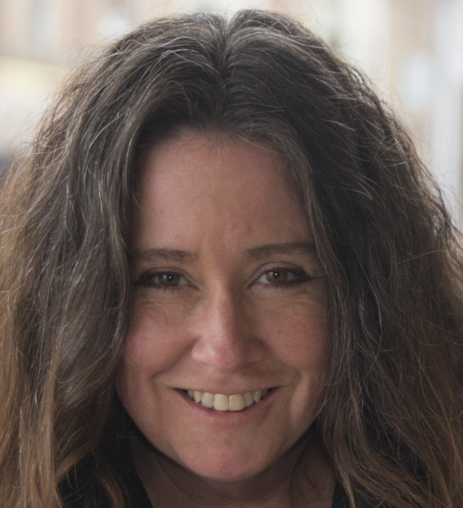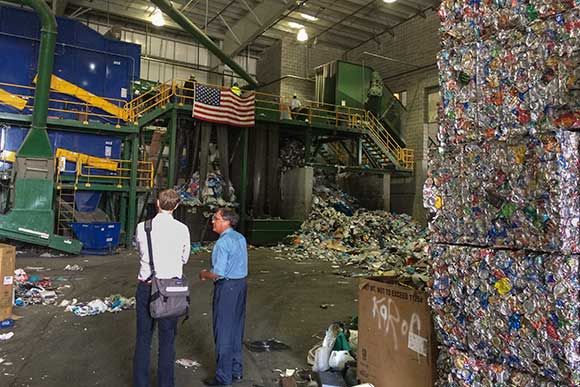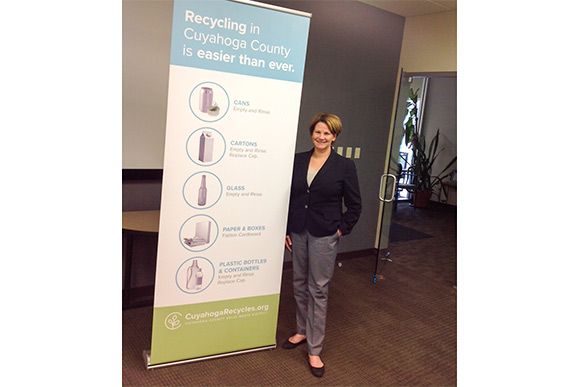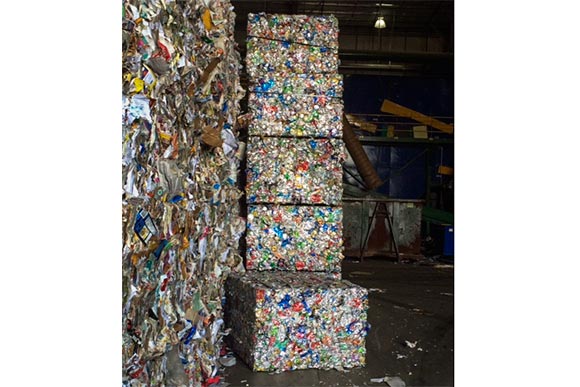Rethinking recycling
Degrees to which we are committed to taking care of Mother Nature certainly vary. Perhaps you practice organic gardening, choose a pedal-powered vehicle over a Prius, or have an array of solar panels lining your roof.
Level of engagement notwithstanding, most everyone has dropped an empty plastic takeout container, coffee cup or bottle into a recycling bin without so much as a thought.
That is where this story begins: with every object we recycle - or at least think we recycle.
"Most people just don't stop and think about their trash," says Diane Bickett, executive director of the Cuyahoga County Solid Waste District (CCSWD). "They just want it to go away, but there’s such a fascinating industry behind all this."
The raw material for that industry is in the bins and bags of mixed recyclables we all set on our curbs for collection. From there, it heads to a materials recovery facility (MRF), where all our discarded cans, cartons, glass, paper, cardboard and plastic bottles and containers become valuable raw material. Cuyahoga County's mixed curbside recyclables go to one of three MRF's, which are located in Twinsburg, Oberlin and Akron. There, the mixed stream is processed through a network of optical sorters and mysterious machines called magnetic current separators.
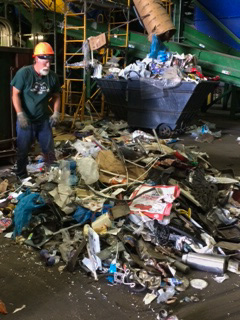 "It's something to see," says Bickett. "People think recycling is very straight forward. It is not. It is very complex."
"It's something to see," says Bickett. "People think recycling is very straight forward. It is not. It is very complex."
The separated trash all has an end use for which there is a market. The paper gets bailed and becomes new fiber products such as toilet paper rolls, newsprint or cardboard. Cans get melted down and made into anything from new cans to bridge abutments. Plastics are cleaned and shredded into pellets that can replace virgin plastic. Glass is made into new glass bottles and containers or perhaps fiberglass insulation.
Here's the kicker. If you want to throw a real wrench in the works, throw a couple of plastic grocery bags in with your empty Diet Pepsi cans.
"People think plastic is plastic is plastic," says Bickett, "but it's not." She adds that any sort of plastic film, be it those ubiquitous blue bags, the plastic wrap for your sandwich or a used zipper bag, will tangle up the separators at the MRF, as will a "tangler," which means any sort of cord, cable or rope.
"They get wrapped up in the machinery and shut everything down and it becomes a giant processing nightmare," says Bickett, adding that used grocery bags should be taken to any number of retailers for recycling and that the optimum way to put out recyclables is loosely housed in a bin, although some cities require recyclables to be set out in blue or clear bags. Those are torn open and emptied courtesy of a "bag breaker" at the MRF.
Putting recyclables in an opaque bag, however, is a different story.
"If you put recycling in a black bag, it probably will get treated as trash," says Bickett. That's because handlers can't see inside the bag and don't know for sure that it contains recyclables. "It will not get recycled. It will end up in the landfill."
Those landfills, incidentally, are at points across the state; there are none left in Cuyahoga County. Hence every bit of garbage you do not recycle must be transported out of the county on a truck that's running on diesel fuel and emitting the associated exhaust.
Furthermore, says Bickett of landfill garbage, "Those materials will end up being entombed forever in those landfills. Whatever raw material or natural resources and energy that went into making the item that you’re throwing out is lost forever in a landfill. Landfills are just the end of the line for all those natural resources," she says.
Other no-no's for the recycle bin include plastic utensils and produce containers, mirrors, light bulbs, crystal, ceramics and shredded paper, which is too small to be captured and recycled at the MRF, but can be recycled via special bins. Some things cannot be recycled and are bound for a landfill no matter what. They include latex paint, medical needles/syringes, medications and Styrofoam containers.
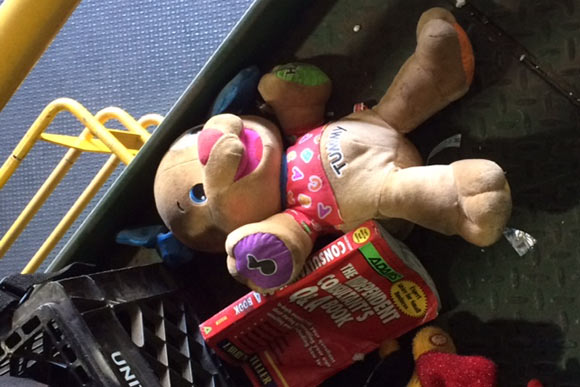
There are other little-ballyhooed benefits of recycling. Every time you put an item out for your city's hazardous household waste collection (HHC) such as leftover oil-based paint, motor oil and lawn/garden chemicals, they end up at CCSWD, which handles all of the county's HHC.
"Most of those have a fuel value," says Bickett, adding that they are shipped to a waste energy facility such as Covanta's in Indiana. There it is converted into steam that powers downtown Indianapolis's heating loop, which includes nearly all of the city's downtown businesses, as well as Indiana University, Purdue University's Indianapolis campus, and Eli Lilly, the area's largest pharmaceutical manufacturer.
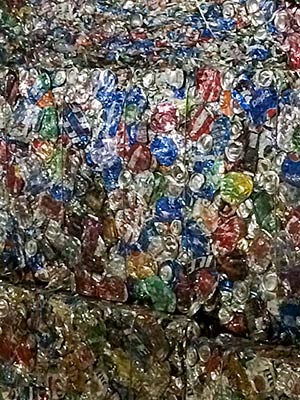 Closer to home, the business of recycling includes a host of tasks such as transport, scrap metal handling, composting and material recovery. Per the 2014 CCSWD's Recycling Economic Study, Cuyahoga County's recycling efforts include 271 businesses that employ 4,723 and garner annual revenues of more than $990 million. They pay out about $6.7 million in property taxes each year. All those employees earn close to $15 million in wages.
Closer to home, the business of recycling includes a host of tasks such as transport, scrap metal handling, composting and material recovery. Per the 2014 CCSWD's Recycling Economic Study, Cuyahoga County's recycling efforts include 271 businesses that employ 4,723 and garner annual revenues of more than $990 million. They pay out about $6.7 million in property taxes each year. All those employees earn close to $15 million in wages.
The average annual value of all that reused stuff? Try nearly $240 million. Keeping it out of the state's landfills also saves the county about $56 million a year. Pretty impressive numbers considering the CCSWD's staff includes just six people, all of whom are women.
"We are a small but mighty staff," notes CCSWD's programs and communications officer Cristie Snyder.
Bickett encourages county residents to use CCSWD as the area's top resource when it comes to recycling information. The CSWD's website includes detailed information about recycling, such as what to do with your old computer or that bag of gently used clothing. To be sure, this page has info on how to dispose of everything from furniture and appliances to old VCR tapes (if you pegged them as a tangler, give yourself a pat on the back).
"We live on a finite planet. We’re already starting to see scarcity in some metals and things," says Bickett. "We need to conserve all those resources. We're wasting them by burying them in a landfill," she adds.
"Recycling really is not an option."
Have a question about recycling? Poke around the CCSWD's informative website, where you can use their contact form at the bottom of the homepage, message them on Facebook, email one of the team members or just give them a call at 216-443-3749.
This story was made possible through a partnership with CDSWD.
